Baghdad Photographer
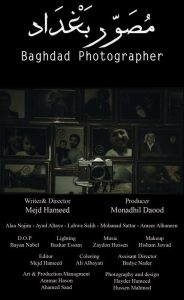 One of the short films being screened this year by the Fort Myers Film Festival is Baghdad Photographer.
One of the short films being screened this year by the Fort Myers Film Festival is Baghdad Photographer.
In this 13-minute film, Hameed tells the story of the hardships suffered by an Iraqi family as a result of the wars and violence that have ravaged the country for decades. He does this through a series of photographs taken by the family matriarch over the course of two generations, beginning with a portrait of a pregnant young mother and her husband attired in regular clothing. The next photograph shows the same woman, her husband and the little boy they had, but this time the husband is dressed in a military uniform. The ensuing portrait depicts the woman dressed in black to mourn her deceased husband. In this shot, she poses with her grown son and his pregnant wife. 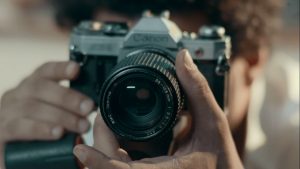 Now a man, the boy is attired like his father before him in military garb. In the final poignant picture, we see the mother and daughter-in-law both dressed in black because both the husband and son have been killed fighting in the Iraqi army.
Now a man, the boy is attired like his father before him in military garb. In the final poignant picture, we see the mother and daughter-in-law both dressed in black because both the husband and son have been killed fighting in the Iraqi army.
“The photographer in the film 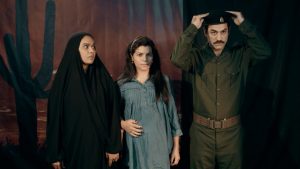 tries to document the life of this broken family and the injustices it suffered due to dysfunctional governments and wrong policies,” expounds the filmmaker, who also wrote and edited the film. More expansively, Hameed continues, the film excoriates the deleterious impact that the country’s constant state of war has
tries to document the life of this broken family and the injustices it suffered due to dysfunctional governments and wrong policies,” expounds the filmmaker, who also wrote and edited the film. More expansively, Hameed continues, the film excoriates the deleterious impact that the country’s constant state of war has 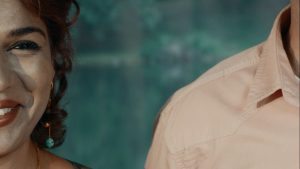 exacted on family, which is the base of the society in Iraqi culture. The killing and loss caused by these wars generate a continuous series of disasters that result in broken families and an increasing number of orphans with no clear future in the shadow of a continuing cycle of war that futilely passes from one generation to the
exacted on family, which is the base of the society in Iraqi culture. The killing and loss caused by these wars generate a continuous series of disasters that result in broken families and an increasing number of orphans with no clear future in the shadow of a continuing cycle of war that futilely passes from one generation to the 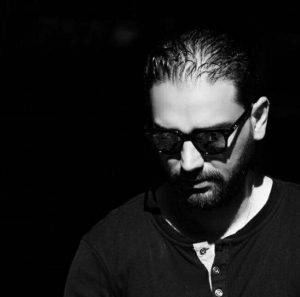 next.
next.
The film was screened during this past September’s TGIM, and received high marks from both the judging panel and the audience who viewed the film that night.
Celebrity judge Dr. Wendy Chase lauded the film’s high production value, beautiful cinematography and lighting, and color palette. But she especially admired the filmmaker’s choice to present the film’s narrative without the benefit of dialogue.
“It’s true cinematic 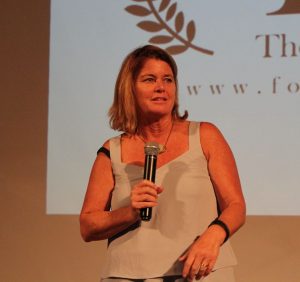 language when there is no dialogue,” said Chase, who noted that by virtue of this cinematic device, Hameed challenged viewers to think through what was happening to the family as evidenced by each ensuing portrait.
language when there is no dialogue,” said Chase, who noted that by virtue of this cinematic device, Hameed challenged viewers to think through what was happening to the family as evidenced by each ensuing portrait.
“Where short films are concerned, it’s usually easier to get the point across when there is no dialogue,” filmmaker and celebrity judge Justin Verely readily agreed.
“For an American audience, 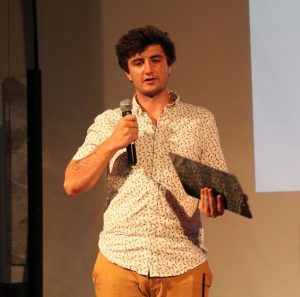 where we are talking about Iraq, where today we’re feeding even more into stereotypes about Muslims, to see [the members of this family] up close, lit beautifully and see them as humans, it’s good and it’s healthy. That’s what art does. It helps us connect with other people. It was a beautiful, poetic film.”
where we are talking about Iraq, where today we’re feeding even more into stereotypes about Muslims, to see [the members of this family] up close, lit beautifully and see them as humans, it’s good and it’s healthy. That’s what art does. It helps us connect with other people. It was a beautiful, poetic film.”
Audience member and popular local performance artist Leila Mesdaghi couldn’t agree more. “Like a poem, there was so much symbolism,” she remarked, adding that “the symbolism touches you very 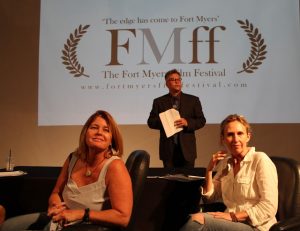 emotionally.”
emotionally.”
Symbolism aside, actor, muralist and Swan Studios filmmaker Marty Wisher was struck by the universality of documenting a family’s journey through time through photographs. “It doesn’t matter what country you’re from,” said Wisher, “[this family is] telling the story of their lives through photographs” just like people do all around the world.
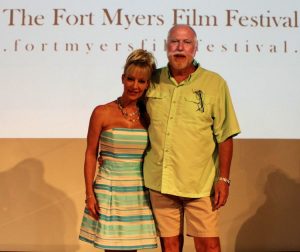 Although it is just now making the rounds in film festivals both in the United States and abroad, Baghdad Photographer has already garnered several awards, including the “Film Factory” award for best short film at Egypt’s El-Gouna Film Festival and First Prize at 3 Minutes 3 Days Film Festival, hosted by Art City for Cinema and Television in Baghdad.
Although it is just now making the rounds in film festivals both in the United States and abroad, Baghdad Photographer has already garnered several awards, including the “Film Factory” award for best short film at Egypt’s El-Gouna Film Festival and First Prize at 3 Minutes 3 Days Film Festival, hosted by Art City for Cinema and Television in Baghdad.
Baghdad Photographer will be screened in the Sidney & Berne Davis Art Center during the International Short block which begins at 1:15 p.m. on Friday, April 12.
March 18, 2019.
#BeYou @ #FMFF.














 Tom Hall is both an amateur artist and aspiring novelist who writes art quest thrillers. He is in the final stages of completing his debut novel titled "Art Detective," a story that fictionalizes the discovery of the fabled billion-dollar Impressionist collection of Parisian art dealer Josse Bernheim-Jeune, thought by many to have perished during World War II when the collection's hiding place, Castle de Rastignac in southern France, was destroyed by the Wehrmacht in reprisal for attacks made by members of the Resistance operating in the area. A former tax attorney, Tom holds a bachelor's degree as well as both a juris doctorate and masters of laws in taxation from the University of Florida. Tom lives in Estero, Florida with his fiancee, Connie, and their four cats.
Tom Hall is both an amateur artist and aspiring novelist who writes art quest thrillers. He is in the final stages of completing his debut novel titled "Art Detective," a story that fictionalizes the discovery of the fabled billion-dollar Impressionist collection of Parisian art dealer Josse Bernheim-Jeune, thought by many to have perished during World War II when the collection's hiding place, Castle de Rastignac in southern France, was destroyed by the Wehrmacht in reprisal for attacks made by members of the Resistance operating in the area. A former tax attorney, Tom holds a bachelor's degree as well as both a juris doctorate and masters of laws in taxation from the University of Florida. Tom lives in Estero, Florida with his fiancee, Connie, and their four cats.